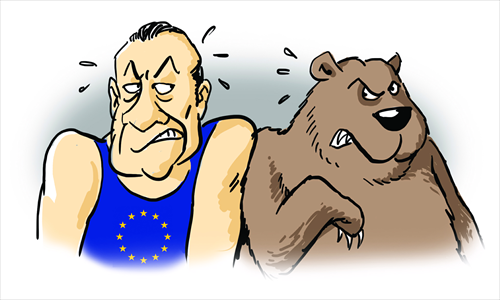HOME >> OP-ED
New order needed in Eastern Europe after Ukraine crisis
By Hugh White Source:Global Times Published: 2014-4-17 20:08:01

Illustration: Liu Rui/GT
Russia's seizure of Crimea last month has fundamentally changed the strategic situation in Europe, because it has significance far beyond Crimea, or even Ukraine. Russia has directly challenged the European strategic order by showing that it is determined to revise the new borders that were drawn in Eastern Europe at the end of the Cold War. It will not stop at Crimea.
Large Russian forces are today poised ready for battle on the Ukrainian border. That does not necessarily mean Moscow has already decided to seize more Ukrainian territory. But it does send a warning that unless Ukraine turns away from the EU and builds closer ties to Moscow, it will face further military incursions.
That means not just the end of Ukraine's drift toward its western neighbors, but an end to Ukraine's freedom of action as a genuinely independent state.
No one should be surprised by Russia's actions.
The loss of Ukraine, Belarus and other territories at the end of the Cold War was a terrible blow to Russians. These territories had been part of Russia for centuries, and it was always likely that Moscow would try to get them back sooner or later.
Nonetheless, the Ukrainian crisis has come as a surprise to Europeans, and now they face hard choices. They are threatening tougher economic sanctions if Moscow pushes further into Ukraine, but Europe won't stop buying Russian gas, and nothing else would change Russian President Vladimir Putin's plans. They certainly won't send their armed forces to help Ukraine resist further Russian attacks.
But if they will not fight Russia in Ukraine, where would they fight? The Europeans must worry that Russia has ambitions beyond Ukraine, and ask where they should draw the "red line" beyond which they would use force to stop Russia expanding its control further.
This is the most critical strategic decision that Europe has faced since the end of the Cold War. Wherever they choose to draw that red line, they must really be prepared to defend it even if that means going to war with Russia.
That is not what the Europeans were thinking about when 10 years ago they thoughtlessly expanded NATO to include not just Poland but the Baltic states.
Now however it seems that today's united Europe has no choice but to commit itself unambiguously to defending these countries from any Russian military pressure.
This all sounds like a return to the Cold War, but in reality the new situation in Europe is very different from the world we knew before 1989.
Then the Soviet Union and the US were the world's two richest and strongest countries, and they competed globally for influence and power. Today Russia is a much smaller and weaker, and its strategic aims are much more limited to its own region. And the Ukrainian crisis makes clear that the US is no longer central to European security.
Russia's actions in Crimea show yet again that the US, for all its immense strength, cannot unilaterally determine events anywhere in the world.
There is nothing it can do to keep Russia out of Ukraine. Nor will it be central to the new strategic order in Europe.
The Europeans no longer need the US to protect them from Russia. Together they are strong enough to contain Russian ambitions by themselves, with five times Russia's population and six times its GDP.
They will need to spend more on defense, but that will be easier now that they have a clear threat to face. And thanks to France and Britain, they have their own nuclear weapons.
And finally, the Ukrainian crisis has big implications for the way we think about the future of the international system more generally.
Russia's actions are worrying because they defy international norms on respect for territorial integrity of all countries. But they are nonetheless a predictable result of Russia's deep dissatisfaction with the post-Cold War order in Eastern Europe.
This shows that international stability depends not just on the norms themselves.
Realistically, those norms have to be applied in a way that respects the core interests of major powers, as the architects of the UN Security Council clearly understood when they gave the P5 a veto.
Arguably the US and Europe pushed Russia too hard after 1991. They failed to respect Russia as a great power. The task now is to build a new order in Eastern Europe which prudently respects the prerogatives of all the great powers and protects the interests of smaller countries.
This is the only way to overcome the present tensions and build a better long term basis for relations between Russia and Europe. That will require give and take on both sides. And it offers some hints for the way that security and stability might be strengthened in other regions as well.
The author is professor of strategic studies at the Australian National University in Canberra. opinion@globaltimes.com.cn
Posted in: Viewpoint